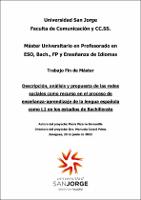Por favor, use este identificador para citar o enlazar este ítem:
https://repositorio.usj.es/handle/123456789/881
Registro completo de metadatos
| Campo DC | Valor | Lengua/Idioma |
|---|---|---|
| dc.contributor.advisor | Catalá Pérez, Manuela | - |
| dc.contributor.author | Pizarro Barcenilla, María Paola | - |
| dc.date.accessioned | 2022-12-12T12:11:24Z | - |
| dc.date.available | 2022-12-12T12:11:24Z | - |
| dc.date.issued | 2022-06-20 | - |
| dc.date.submitted | 2022 | - |
| dc.identifier.uri | https://repositorio.usj.es/handle/123456789/881 | - |
| dc.description | The aim of this Master’s Thesis (MT) is to explore the possibilities of applying social networks to the learning of the Spanish language as L1 in the context of the first year of Baccalaureate. Virtual platforms have had a great impact on 21st century society, specifically among the adolescent population. In accordance with this reality, through the applications Instagram, mainly, TikTok, YouTube and Twitter, a didactic proposal has been developed consisting of 16 activities which intend to stimulate the acquisition of significant knowledge in students in an entertaining and participatory way as well as to encourage collaborative work and metacognitive learning. Half of the activities are designed from an educational influencer approach while the remaining 8 ones have been developed in a conventional way, all of them using a multiple methodology (m-learning, gamification, collaborative learning and, to a lesser extent, Flipped Classroom). A holistic assessment with constant feedback to students is proposed, consisting of 4 assessment rubrics: teacher-student assessment, student self-assessment, peer assessment and teacher self-assessment. This educational experience allows students to construct their own learning, limiting the role of the teacher to that of a guiding and facilitating figure of the teaching-learning process. The methodology applied is qualitative and focuses on teachers' beliefs about the use of social networks in the classroom. The analysis of the interviews reveals the benefits and limitations of this didactic resource and confirms the lack of digital training of the teaching staff. | en_US |
| dc.description.abstract | El objetivo de este Trabajo Fin de Máster (TFM) consiste en explorar las posibilidades de aplicación de las redes sociales (RRSS) para el aprendizaje de la lengua española como L1 en el contexto del primer curso de Bachillerato. Las plataformas virtuales han causado un gran impacto en la sociedad del siglo XXI, concretamente entre la población adolescente. De acuerdo a esta realidad, a través de las aplicaciones Instagram, principalmente, TikTok, YouTube y Twitter, se ha elaborado una propuesta didáctica compuesta por 16 actividades con las que se pretende estimular la adquisición de conocimiento significativo en el alumnado de manera entretenida y participativa, así como fomentar el trabajo colaborativo y el aprendizaje metacognitivo. La mitad de las actividades están diseñadas desde un enfoque de influencer educativa, mientras que las 8 restantes se han elaborado de manera convencional, todas ellas empleando una metodología múltiple (m-learning, gamificación, aprendizaje colaborativo y, en menor medida, Flipped Classroom). Se plantea una evaluación holística con retroalimentación constante al alumnado compuesta por 4 rúbricas de evaluación: evaluación docente a alumno, autoevaluación alumno, evaluación por pares y autoevaluación docente. Esta experiencia educativa permite a los estudiantes constuir su propio aprendizaje, limitándose el papel del docente a una figura guía y dinamizadora del proceso de enseñanza-aprendizaje. La metodología aplicada es de tipo cualitativo sobre las creencias docentes en torno a la utilización de las redes sociales en el aula. El análisis de las entrevistas aporta los beneficios y las limitaciones de este recurso didáctico y se confirma la falta de formación digital del profesorado. | en_US |
| dc.format.extent | 136 p. | en_US |
| dc.format.mimetype | application/pdf | en_US |
| dc.language.iso | spa | en_US |
| dc.publisher | Universidad San Jorge | en_US |
| dc.relation.requires | adobe | en_US |
| dc.rights | Attribution-NonCommercial-NoDerivatives 4.0 Internacional | * |
| dc.rights.uri | http://creativecommons.org/licenses/by-nc-nd/4.0/ | * |
| dc.subject | lengua española | en_US |
| dc.subject | redes sociales | en_US |
| dc.subject | influencer educativo | en_US |
| dc.subject | metacognición | en_US |
| dc.subject | recursos educativos | en_US |
| dc.subject | TIC | en_US |
| dc.subject | spanish language | en_US |
| dc.subject | social networks | en_US |
| dc.subject | educational influencer | en_US |
| dc.subject | metacognition | en_US |
| dc.subject | educational resources | en_US |
| dc.subject | ICT | en_US |
| dc.title | Descripción, análisis y propuesta de las redes sociales como recurso en el proceso de enseñanza-aprendizaje de la Lengua Española como L1 en los estudios de Bachillerato | en_US |
| dc.type | info:eu-repo/semantics/masterThesis | en_US |
| dc.rights.accessrights | info:eu-repo/semantics/openAccess | en_US |
| Aparece en las colecciones: | Máster en Profesorado de ESO, Bachillerato, FP y enseñanza de idiomas | |
Ficheros en este ítem:
| Fichero | Descripción | Tamaño | Formato | |
|---|---|---|---|---|
| Descripción análisis y propuesta redes sociales.pdf | 4,31 MB | Adobe PDF |  Visualizar/Abrir |
Este ítem está sujeto a una licencia Creative Commons Licencia Creative Commons

